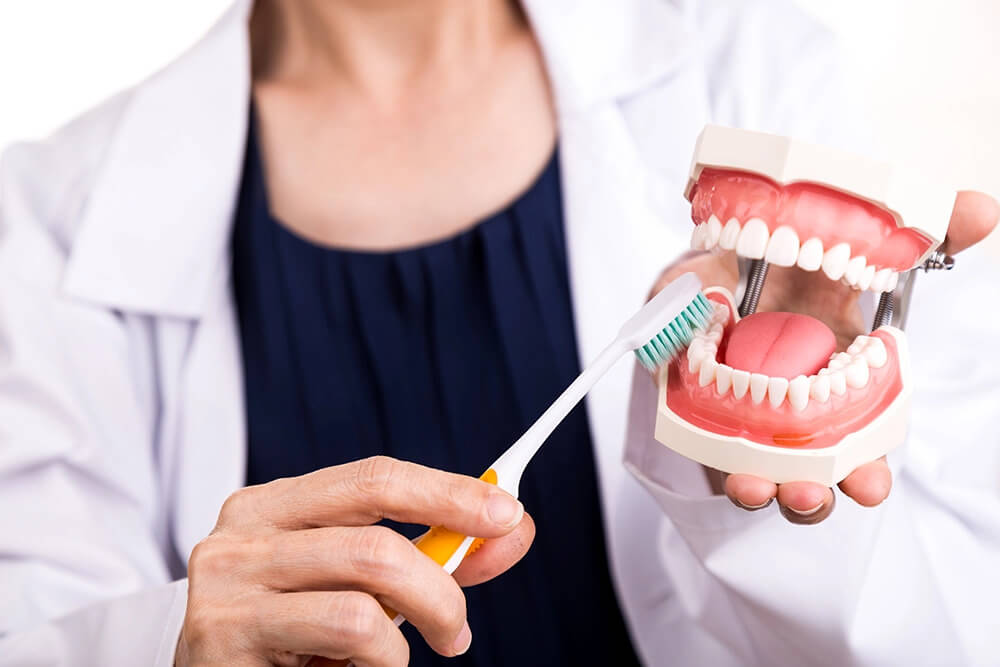Hi, my name is Dr. Olga Degtyareva. Here at Always Beautiful Smile, we get a lot of questions about dentures—what they are, and when they're needed. So I'm here to answer the most commonly asked ones.
What are dentures?
Let's talk about dentures. They are a way of replacing missing teeth. So if you've lost several of your teeth or all of your teeth, this is a way to replace them. Traditionally, it is a removable piece, so this is something that comes in and out every single day. It's definitely a way of replacing teeth. It's probably the most cost-effective way of replacing natural teeth. Is it as close as it gets to having your own? No, there are other options out there for that, but this is an option and this works. Half of America is walking around with dentures and nobody knows. That's the whole point: they have to look and function well, but it's a way of replacing missing teeth. That's the whole point of dentures.
When should a patient get a denture?
Well, if they're missing all of the teeth or missing all of the teeth on an arch, or most of the teeth—you know, we've got three, four, five, six teeth left, and those teeth are in pretty good condition—then we can talk about doing a denture. If implants aren't an option for medical reasons, for financial reasons, or they're just not in the cards and we need teeth, then dentures are an absolutely feasible way to go. This is why we do them.
What are some alternatives to dentures?
Missing teeth can be replaced with implants. If we're missing one or two, then you need one or two implants. If we're missing a whole arch of teeth, then you need five or six to replace all of those teeth. There are different options. Sometimes we can replace the missing teeth with a bridge. A bridge is when you cut the tooth behind the missing one and the tooth in front of the missing one for crowns, and then you put in connected crowns. That's another way of replacing missing teeth. Bridges and implants are much closer to natural teeth. They're not removable; it's not something you take in and out every day, so it feels as close as it can get to natural teeth. But there are limitations. Sometimes there's not enough bone for an implant, sometimes you don't have enough teeth to do a bridge, and there are too many missing teeth. It's very situational when we recommend what. But dentures work, implants work, bridges work; it all depends on what you need.
What are the different types of dentures?
If you have some teeth but are missing a bunch, that's called a partial denture, which means we're partly replacing the teeth. The teeth that you have, if they're good teeth and they're stable and in good condition, can stay. They're going to be like little anchors that hold the rest of the denture. So that's a partial denture to partly replace the teeth. Sometimes you're missing all the teeth. We have no teeth, whether it's no top teeth, no bottom teeth, or no teeth altogether. Those get replaced with a complete denture because we're completely replacing the entire arch. An upper complete denture is usually not a problem; it looks great, feels as close enough as we can get to natural teeth. The lower complete denture is a problem. It is a problem for everybody across the board because the lower denture doesn't have a lot of stability to sit and stay in one place. When we're talking about doing a lower denture, we always recommend putting in at least two implants, and then you get an implant overdenture. Now you can have a denture that's supported by implants, so it doesn't have to sit on the gum; it can sit on implants. That's another option on the lower jaw. You need two, and then we put little buttons—like the button on your shirt—on the denture. The denture snaps onto the implants. You can do two on the bottom, and we need at least four on the top. Again, these are removable options, so this is still something you're going to take in and out every day, but this way they sit on implants as opposed to just sitting on the gum, giving it a whole lot more stability.
What happens during the denture fitting process?
It's a lot of molds. We like to now use digital impressions where we can to take digital images of your jaw, to take images of the teeth that are there, if you have any, and to take images of the gums that you have. The next several steps are all pretty simple for you. Whether we have to do traditional molds, where we put on the lip and play around with you a little bit, or play with some wax and set some teeth in wax, then you get to come in and actually have an idea of what the teeth are going to look like. We get to pick the color, we get to pick the shape—they need to look good, they need to function well—and then you just take them home. It's all pretty easy. There's no need to numb anything if we're not taking out any teeth; it's just molds and images and arts and crafts with some wax. That's basically the denture procedure.
What should you expect when you first get dentures?
When you first get your set of dentures, there's going to be a learning curve with them. It is not the same as having your own teeth; it's not the same as having nothing there. There's a learning curve here. You have to learn how to speak with them, you have to learn how to eat with them, and there's always a little bit of a fitting process. When you bring home a brand new pair of shoes, they fit great in the store; then you go home and start to get a little blister. It's super similar with the dentures. They can fit great in the office, but you go home, start to eat with them, and get a little sore here, a little sore there. You come back and readjust it as many times as you need to. The sores are expected and are part of the process. But like I mentioned, there is a learning curve here because you're not going to go home and eat a steak on your first day. You're going to go home and start with softer foods: mashed potatoes, soups, yogurts, and smaller bites. You're going to be very proper with a fork and knife, cutting up your food into smaller pieces. You start with your fish and your chicken and meatballs, and then work your way up to the harder vegetables and harder meats. But we've got to start somewhere. So learning curve, yes, that's going to happen. That's all right; you get used to it like anything else.
How do you take care of your dentures?
You have to keep them clean. After meals, you'll notice little bits of food get stuck around the denture. Then you just go and rinse them out; super simple. Take them out, rinse them under the sink, and put them back in. To clean them, we recommend that you just use soap and water. I don't want you using toothpaste on a denture; it's too aggressive, too abrasive for the material that the denture is made out of. You're going to have problems down the line. You don't need it. Soap and water is all you need. At night, before you go to bed, you put them in a cup with a denture cleaner, like those Polident capsules, and leave them overnight. It doesn't sting. That's all you need: nice and easy.
How long do dentures last?
You should get a few years out of them. But when you don't have any teeth, you lose the bone in your mouth. The bone recedes, and you lose a couple of percent every year. Multiply that by 2, 3, 4, 5, 10, 12 years, and over the course of time, the bone recedes, but the denture doesn't change. Which means the denture over time gets looser because you're losing the bone, but the denture is a piece of plastic; it stays exactly as it is. So over the course of time, I expect the denture to get loose, in which case you're going to need a replacement, usually every 5ish years, sometimes 10, depending on how quickly your particular bone absorbs.
When should you set up an appointment for a denture?
As soon as possible. If you have a denture now that you're not happy with, don't like the way it looks, don't like the way it feels, can't eat with it, it's not comfortable, or it's old, it's time for a new one. Make an appointment. If you've never had a denture, have a bunch of missing teeth, and are looking to finally be able to chew some real food, need a denture, no problem. Give our office a call; we'll be happy to help you.
 Dentures and Partial Dentures
Dentures and Partial Dentures
Welcome to Always Beautiful Smile, your premier dental service provider for Dentures and Partial Dentures in Brooklyn, NY. Our experienced team of dental professionals is committed to helping you achieve optimal oral health and a beautiful smile.
What Are Dentures and Partial Dentures?
Dentures and Partial Dentures are restorative dental solutions that can replace missing teeth and restore your smile. Our team of skilled professionals will work with you to determine the best course of treatment, and we use state-of-the-art technology and techniques to ensure that your dentures are both durable and aesthetically pleasing.
Improved Oral Health
Dentures and Partial Dentures can improve your overall oral health by replacing missing teeth, preventing bone loss, and improving your bite.
Customized Solutions
We use high-quality materials to create dentures and partial dentures that look and feel like natural teeth, ensuring that your smile looks and feels natural.
Natural-Looking Results
Achieve natural-looking results with PST, as the gum tissue is gently repositioned to cover the exposed root.
At Always Beautiful Smile, we understand the importance of replacing missing teeth and strive to provide the best possible care to our patients. Our team of professionals is committed to helping you achieve optimal oral health and a beautiful smile.

How We Can Help
We offer affordable and competitive pricing options for dentures and partial dentures services, and we work with insurance providers to ensure that our patients get the coverage they deserve. We also provide personalized care and attention to each of our patients, ensuring that you feel comfortable and informed throughout the treatment process.
- Professional Denture Repair
- Denture Cleaning and Maintenance
- Convenient and Time-Saving
- Improved Confidence
Schedule your appointment today. Call us now! (440) 659-1455

